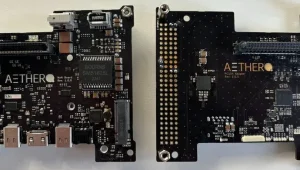Cosmic Shielding Corp. (CSC) is set to support the launch of a groundbreaking radiation-hardened edge computer developed by San Francisco startup Aethero, scheduled to fly aboard SpaceX's Falcon-9 Transporter-11 from Vandenberg Space Force Base on July 10.
The computer, featuring Nvidia's Jetson Orin NX graphics processing unit, is hailed as “the fastest AI-capable chip in space,” according to Yanni Barghouty, co-founder and CEO of CSC, in an interview with SpaceNews.
Atlanta-based CSC, established in 2021, has been pioneering the use of its 3D-printed nanocomposite metal material, known as Plasteel. This material was first tested during a 2023 Axiom Space mission to the International Space Station and subsequently deployed on a Quantum Space satellite in March for radiation detection purposes.
Barghouty emphasized that the upcoming mission aims to demonstrate CSC's capability to safeguard a commercial-off-the-shelf flight computer using vulnerable components. He highlighted the potential impact on the space industry, stating, “Being able to tap into that terrestrial semiconductor industry supply chain would do wonders for lead times and availability.”
The collaboration with Aethero, initiated in March, marks a significant step towards enhancing space computing capabilities. Barghouty noted that CSC's technology will enclose Aethero's NxN edge computing module for the upcoming flight, with plans to jointly introduce a new line of computers.
Edward Ge, CEO and co-founder of Aethero, praised CSC's shielding technology, stating, “Cosmic Shielding is the only company we've seen to offer shielding that makes it possible for advanced state-of-the-art processors to operate in deep space for long-term missions.”
The radiation-hardened GPUs are expected to benefit applications such as Earth-observation, high-throughput-communications satellites, space-based data centers, and in-space servicing and manufacturing, according to Barghouty.
If successful, the demonstration could sway space companies towards utilizing commercial-off-the-shelf systems over traditional radiation-hardened components, potentially reducing costs significantly.
